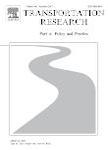版权所有:内蒙古大学图书馆 技术提供:维普资讯• 智图
内蒙古自治区呼和浩特市赛罕区大学西街235号 邮编: 010021

作者机构:Natl Sun Yat Sen Univ Int Business Bachelor Program Kaohsiung Taiwan Tunghai Univ Sustainabil Sci & Management Program Taichung Taiwan Natl Sun Yat Sen Univ Ctr Gen Educ Kaohsiung Taiwan
出 版 物:《TRANSPORTATION RESEARCH PART A-POLICY AND PRACTICE》 (Transp. Res. Part A Policy Pract.)
年 卷 期:2024年第190卷
核心收录:
学科分类:0201[经济学-理论经济学] 08[工学] 0823[工学-交通运输工程]
基 金:National Science and Technology Council Taiwan (NSTC) [111-2410-H-110 -096 -MY2 113-2410-H-110 -094]
主 题:Transportation futures Sustainability students Viewpoints Q methodology
摘 要:As we approach critical milestones such as the year 2050, by which time the global community aims to achieve zero carbon emissions, the decisions we make today concerning transportation infrastructure become increasingly influential. This research seeks to broaden the dialogue beyond the traditional domain of current policymakers and transport planners by incorporating the perspectives of the generation that will inherit and live with the long-term impacts of today s decisions. This study investigates the perspectives of learners in a unique sustainability-focused undergraduate program in Taiwan regarding transportation s future in a world impacted by anthropogenic climate change. Considering their potential as future sustainability professionals and leaders, understanding their views can offer insights for both educational and transportation policy. Using Q methodology, this research captures a range of viewpoints. The five distinct perspectives include the advocates of collective responsibility and tech-optimists, who hold positive views towards collective action and technological advancements respectively. The pragmatic solitaries and private transport advocates, who prioritize personal comfort and express skepticism about environmental targets. The public transport advocates, meanwhile, favor shared forms of transport and see a crucial role for the government in carbon reduction efforts. The study s significance lies in its emphasis on a previously underexplored demographic within the unique context of Taiwan, revealing their perspectives on a transportation future shaped by climate change by using Q methodology, and its implications for policy derived from the findings.